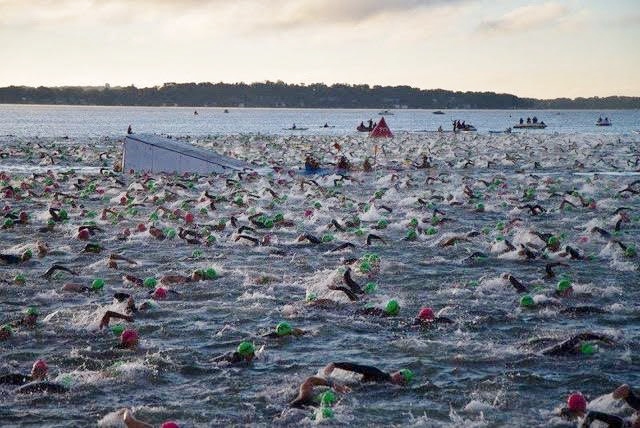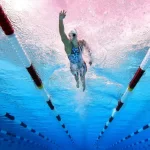The fears related to open waters are very real. The safety of a swimming pool, complete with walls to rest, lane lines to grab on to if need be, calm and clear water, lifeguards, and a shallow bottom to walk if necessary, not to mention temperature-controlled, leave you feeling safe and secure.
In the open water, these conveniences are not always available. Sometimes there are lifeguards, but when you are 100 yards offshore, swimming in 20 feet of water among hundreds of other swimmers, that may not be much help anyhow. In most cases, you are not even able to see your hand in front of your face in the water, and that can be a bit scary if you are not used to it.
Lakes are not as scary as the ocean – they are almost always calmer – but you have to keep an eye out for boaters and be sure to swim in designated areas.
The truth is, swimming in open water is not a piece of cake. Even the best pool swimmer can have an anxiety attack in open water. You have to always be aware of your surroundings and practice safe swimming. It’s common to hyperventilate when you first put your face in water below 65 degrees or so. Hopefully these tips below will help you make the most of your open water training:
- Protect Your Face! Getting kicked in the face is one of the biggest risks and fears for triathletes when you’re in the open water with hundreds of other swimmers. To reduce this risk, try swimming “catch-up style”. This is when you leave one hand extended in front of you while the other arm pulls through a complete stroke. Then when that hand gets back in front of you, you begin your pull with the other arm. So then one hand is always protecting your face from the foot in front of you. Once the pack breaks up you can go back to a conventional stroke. You can also “create your space” by pulling a little wide to keep other swimmers from coming in contact with your head and face.
- Practice. Practice. Try to swim the course before the event if possible so you know the water, route, etc. Develop a pre-race routine before your event to help remain relaxed and confident. Get there early on race day and make sure that your wetsuit is comfortable. Adjust the sleeves and legs so that there’s plenty of room for arm and body movements. Don’t wait until race day to try that wetsuit on!
- Have Faith in your Training and Stroke. It is not uncommon for all of us to get a little nervous during an open water swim because we can only see a few feet in front of us! So, we tend to lift our head and check our position way too often. And, the more we look, the more disruptive we are to our own stroke and pace. Doing this will wear you out physically and mentally. So, relax! Have faith in your training and your stroke! You should be able to swim 6-8 strokes before lifting your head without seriously straying off course.
- Embrace the Crowded Conditions! Many swimmers tend to get anxious at the crowded conditions they face during open water races. This is normal. Just remember that you are all in this together. Nobody is there to hit you on purpose, but realize that occasional bumps are inevitable.
- Keep Calm and Breathe. Easier said than done I know. But if you don’t you’ll be in trouble. When the open swim starts, it’s going to feel overwhelming, but it doesn’t have to be. Stay focused on what you’re doing and where you need to be at the moment. The chaos always dies down within a couple minutes as the pack spreads out. But if you’re still panicking, keep breathing. Usually when we panic in the water we want to flip onto our back to catch our breath by taking in large breaths of air. Normally, to calm down, you would breathe into a paper bag, but you can’t do that in the water – but you can apply the principle of breathing and blowing. Focus on turning your head to get a good breath of air, then stick your face in the water and focus on blowing bubbles at a steady rate. It will help you focus on regulating your breathing and your mind. Once you can get your heart rate back to normal, move right back into your stroke.
Hopefully if you use these tips, your open water swim will become as easy and simple as pool training in no time! If you are in need of an open water swim coach to help you with your training, contact me today and I can help get you on your way to your next triathlon!







